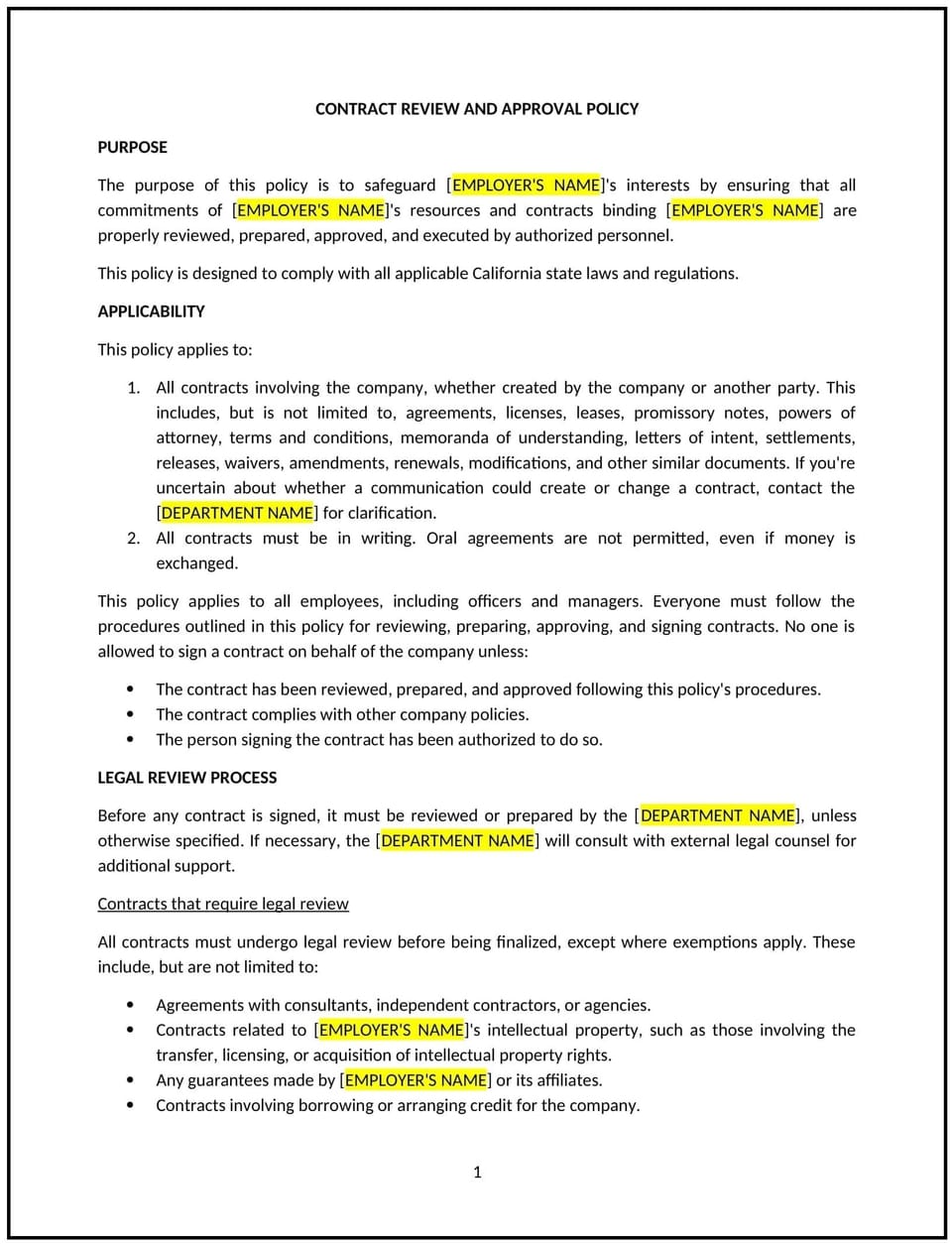Contract review and approval policy (California): Free template

Contract review and approval policy (California)
In California, a contract review and approval policy provides businesses with guidelines for reviewing, negotiating, and approving contracts to ensure clarity, mitigate risks, and support compliance with state and federal laws. This policy establishes a standardized process for handling contracts, ensuring all agreements align with the business’s objectives and legal obligations.
This policy outlines the roles, responsibilities, and procedures involved in contract review and approval. By implementing this policy, California businesses can reduce errors, enhance accountability, and streamline contract management.
How to use this contract review and approval policy (California)
- Define scope: Specify the types of contracts covered by the policy, such as vendor agreements, employment contracts, or service contracts.
- Assign responsibilities: Outline who is responsible for drafting, reviewing, and approving contracts, including legal or management teams.
- Establish review procedures: Provide clear steps for reviewing contracts, such as identifying risks, ensuring compliance with California laws, and confirming terms align with business goals.
- Implement approval workflows: Detail the process for obtaining necessary approvals, including sign-off levels for different types of contracts.
- Document storage: Require all finalized contracts to be securely stored and easily accessible for future reference.
Benefits of using this contract review and approval policy (California)
This policy offers several advantages for California businesses:
- Supports compliance: Reflects California laws and ensures contracts meet legal and regulatory requirements.
- Reduces risks: Helps identify and mitigate potential liabilities or unfavorable terms before contracts are executed.
- Promotes efficiency: Streamlines the contract management process, reducing delays and errors.
- Enhances accountability: Clarifies roles and responsibilities, ensuring consistent handling of contracts.
- Protects business interests: Ensures all contracts align with the business’s objectives and minimize risks.
Tips for using this contract review and approval policy (California)
- Reflect California-specific laws: Address state requirements for contracts, including terms related to indemnification, arbitration, or compliance with labor codes.
- Train employees: Provide training on identifying contract risks and using review checklists effectively.
- Use contract management tools: Implement software to track contract reviews, approvals, and deadlines for renewals or terminations.
- Monitor compliance: Conduct regular audits of executed contracts to ensure adherence to policy standards.
- Review regularly: Update the policy to reflect changes in California laws, business practices, or industry standards.
Q: How does this policy benefit the business?
A: This policy supports compliance with California laws, reduces risks, and ensures contracts align with the business’s objectives and interests.
Q: What types of contracts are covered under this policy?
A: The policy applies to various contracts, including vendor agreements, client contracts, employment agreements, and other binding arrangements.
Q: How does this policy support compliance with California laws?
A: The policy reflects California-specific legal requirements, supporting fair and lawful handling of contracts.
Q: What steps should employees take during the contract review process?
A: Employees should identify risks, verify terms align with business goals, and consult legal or management teams as outlined in the policy.
Q: How can the business track contract approvals and deadlines?
A: The business can use contract management software to monitor review progress, obtain approvals, and track renewal or termination dates.
This article contains general legal information and does not contain legal advice. Cobrief is not a law firm or a substitute for an attorney or law firm. The law is complex and changes often. For legal advice, please ask a lawyer.


